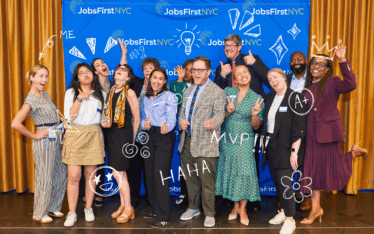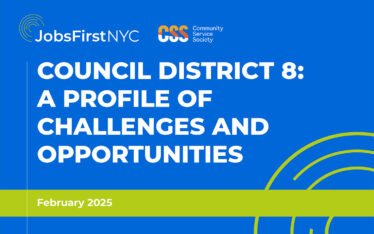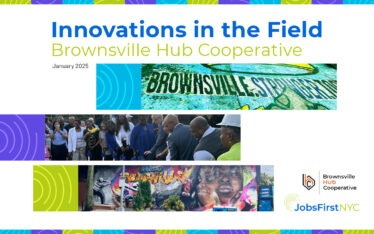As inflation looms and the news of tariffs ripples across the country, young adults in New York City who are out of school and out of work face compounding challenges that demand close attention and thoughtful responses. But even among those who are working, many still find themselves in a precarious situation. These young adults—often concentrated in sectors like retail, hospitality, and food service—are especially susceptible to shifts in the labor market, price surges, and limited access to economic mobility.
In 2023, JobsFirstNYC released Reversing Nearly a Decade of Positive Trends, a data brief that detailed the pandemic’s toll on New York City’s young adults who are neither working nor in school.¹ The findings were stark: while the broader labor market has seen recovery, youth unemployment remains disproportionately high—10.3% overall, and up to 31% and 26% among young Black and Latino workers, respectively.²
Expanding Access to Good Jobs
Today, inflation threatens to outpace wage growth for young adults, many of whom earn median full-time wages of just $28,138 compared to the citywide median of $57,554.³ At the same time, part-time and gig-economy work is on the rise, often offering inconsistent hours and little opportunity for long-term advancement.⁴
The federal government’s proposed tariffs could lead to cost increases across sectors that employ a large share of young adults. According to the New York City Comptroller’s April 2025 report, the leisure and hospitality sector alone is projected to decline by over 6% in a mild recession and nearly 10% in a deeper one—signaling a troubling outlook for youth employment. Nationwide, according to a CNN Business article, “about 25% of CFOs say they have cut their 2025 hiring plans due to tariffs.” For young New Yorkers already navigating unstable employment, the pressure is mounting.
We must pay close attention—the warning signs are coming from the highest levels. Speaking about the potential consequences of the proposed tariff measures, Federal Reserve Chair Jerome Powell cautioned: “Unemployment is likely to go up as the economy slows, in all likelihood, and inflation is likely to go up as tariffs find their way and some part of those tariffs come to be paid by the public.”⁵
New York City’s largest private sector employers are also expressing concern. In a recent interview with Fortune, JPMorgan Chase CEO Jamie Dimon sounded the alarm on US “tariff tactics,” warning that such trade measures could “weaken long-standing military and economic alliances.”⁶ These disruptions would not only undermine global stability but also deliver another blow to an already fragile economy—one where young workers are often first to feel the impact.
Keeping Education Within Reach
As inflation drives up the price of tuition, transportation, and living expenses, many young people may be forced to delay—or forego—postsecondary education. For those attempting to re-engage through community college, certification programs, or alternative learning pathways, the act of balancing school, work, and survival in one of the most expensive cities in the world can quickly become untenable.
As highlighted in our data brief, “lack of college degrees creates a barrier to accessing economic mobility.” This leads to a troubling cycle: without access to affordable, flexible, and supportive education options, many young New Yorkers remain trapped in low-wage, part-time employment with limited opportunities for advancement.
This moment calls for robust policy discussion and action along with sustained community investment. We cannot afford to be reactive, because the stakes are too high.
Five of the recommendations from our 2023 brief remain more pressing than ever:
- Address part-time, low-wage work as a structural warning sign.
- Support neighborhood-level partnerships that create real employment pathways and career pathways that provide financial stability and opportunity.
- Prioritize economic mobility for communities facing historical economic barriers such as disinvestment and exclusion from equitable education opportunities.
- Connect education and workforce development through training pathways that prepare individuals for in-demand careers and employer needs.
- Pursue thoughtful policy changes that foster long-term stability and opportunity.
Since releasing our data brief, JobsFirstNYC has been taking bold steps to address the challenges facing young adults.We have also allocated 37% of a $4 million gift from MacKenzie Scott to support solutions in communities overlooked by current resource allocation systems. We have strategically invested in partnerships that strengthen workforce development organizations and advance community economic mobility. Initiatives such as our Healthcare and Tech Sector Networks are creating pathways to higher wage jobs., and our Lower East Side Employment Network is reporting average starting wages of more than $20/hour. Neighborhood-level partnerships such as the Brownsville Hub Cooperative are driving community-led plans for economic mobility in Brooklyn. And to bridge education and the workforce, we have deepened work with New York City Public Schools (NYCPS). At the system level, we are partnering with the NYCPS’s Office of Student Pathways to strengthen their Industry Commissions. With District 79, JobsFirstNYC is collaborating with district and school leaders along with school staff to bolster career-connected learning. And in partnership with Northwell Health, JobsFirstNYC is writing a curriculum to prepare young New Yorkers for healthcare careers.
In recent months, JobsFirstNYC, through its partnerships, has supported access to education, skills training, and employment opportunities for more than 2,000 young adults across all five boroughs—connecting them to pathways that support long-term economic mobility. These milestones reflect real progress—but they are fragile.
With new tariffs and inflationary pressures disproportionately affecting young adults, these hard-won gains are at risk of being reversed. Now more than ever, we must safeguard and strengthen the systems that support young people’s economic mobility and long-term financial stability.
As we weigh the broader economic implications of tariffs and inflation, we must ask: Are we watching closely enough? This isn’t just about the strength of the economy—it’s about who gets to participate in it.
The road ahead may be bumpy, and the future of New York’s workforce depends on ensuring that young people are front and center in every economic conversation. Now is the time to act.
Our upcoming 2-day Adapting to the Future of Work convening will focus on how we can use Local Solutions to make a Lasting Impact for young New Yorkers.
JobsFirstNYC creates and advances solutions that break down barriers and transform the systems supporting young adults and their communities in the pursuit of economic opportunities. Together with our partners, we embrace a collaborative 5-step process to identify challenges, incubate solutions, and advance what works.
¹ JobsFirstNYC. Reversing Nearly a Decade of Positive Trends. 2023.
² Ibid.
³ NYC Comptroller. April 2025 Economic Outlook Report.
⁴ CNN Business. “CFOs Pull Back on Hiring Amid Tariff Uncertainty.” May 2025.
⁵ Federal Reserve. “Remarks by Jerome Powell.” May 2025.
⁶ Fortune Magazine. “Jamie Dimon Warns of Global Fallout from Tariff War.” May 2025.




